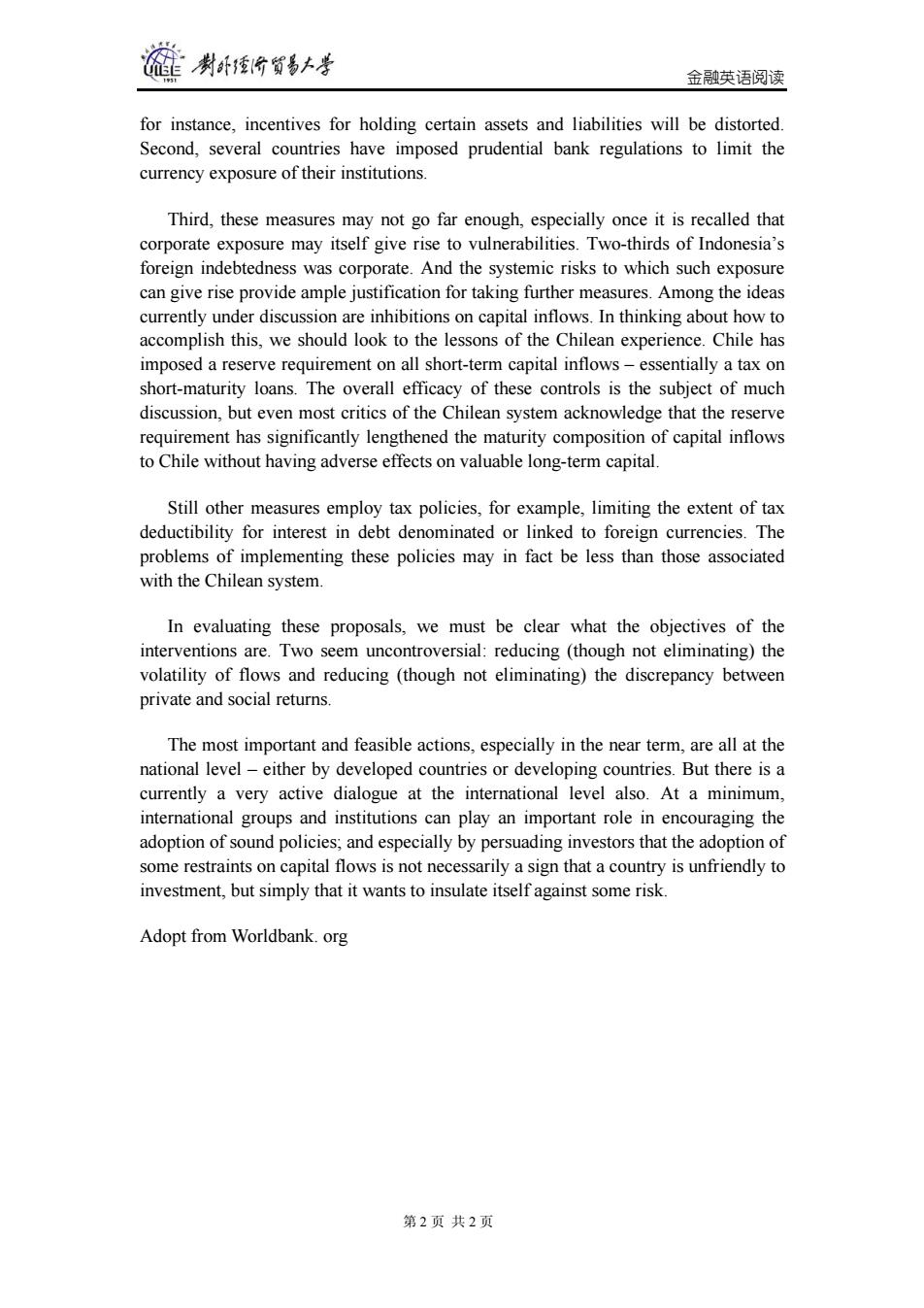正在加载图片...

制卧台贸易上兰 金融英语阅读 for instance,incentives for holding certain assets and liabilities will be distorted. Second,several countries have imposed prudential bank regulations to limit the currency exposure of their institutions. Third,these measures may not go far enough,especially once it is recalled that corporate exposure may itself give rise to vulnerabilities.Two-thirds of Indonesia's foreign indebtedness was corporate.And the systemic risks to which such exposure can give rise provide ample justification for taking further measures.Among the ideas currently under discussion are inhibitions on capital inflows.In thinking about how to accomplish this,we should look to the lessons of the Chilean experience.Chile has imposed a reserve requirement on all short-term capital inflows-essentially a tax on short-maturity loans.The overall efficacy of these controls is the subject of much discussion,but even most critics of the Chilean system acknowledge that the reserve requirement has significantly lengthened the maturity composition of capital inflows to Chile without having adverse effects on valuable long-term capital. Still other measures employ tax policies,for example,limiting the extent of tax deductibility for interest in debt denominated or linked to foreign currencies.The problems of implementing these policies may in fact be less than those associated with the Chilean system. In evaluating these proposals,we must be clear what the objectives of the interventions are.Two seem uncontroversial:reducing (though not eliminating)the volatility of flows and reducing (though not eliminating)the discrepancy between private and social returns. The most important and feasible actions,especially in the near term,are all at the national level-either by developed countries or developing countries.But there is a currently a very active dialogue at the international level also.At a minimum, international groups and institutions can play an important role in encouraging the adoption of sound policies;and especially by persuading investors that the adoption of some restraints on capital flows is not necessarily a sign that a country is unfriendly to investment,but simply that it wants to insulate itself against some risk. Adopt from Worldbank.org 第2页共2页金融英语阅读 for instance, incentives for holding certain assets and liabilities will be distorted. Second, several countries have imposed prudential bank regulations to limit the currency exposure of their institutions. Third, these measures may not go far enough, especially once it is recalled that corporate exposure may itself give rise to vulnerabilities. Two-thirds of Indonesia’s foreign indebtedness was corporate. And the systemic risks to which such exposure can give rise provide ample justification for taking further measures. Among the ideas currently under discussion are inhibitions on capital inflows. In thinking about how to accomplish this, we should look to the lessons of the Chilean experience. Chile has imposed a reserve requirement on all short-term capital inflows – essentially a tax on short-maturity loans. The overall efficacy of these controls is the subject of much discussion, but even most critics of the Chilean system acknowledge that the reserve requirement has significantly lengthened the maturity composition of capital inflows to Chile without having adverse effects on valuable long-term capital. Still other measures employ tax policies, for example, limiting the extent of tax deductibility for interest in debt denominated or linked to foreign currencies. The problems of implementing these policies may in fact be less than those associated with the Chilean system. In evaluating these proposals, we must be clear what the objectives of the interventions are. Two seem uncontroversial: reducing (though not eliminating) the volatility of flows and reducing (though not eliminating) the discrepancy between private and social returns. The most important and feasible actions, especially in the near term, are all at the national level – either by developed countries or developing countries. But there is a currently a very active dialogue at the international level also. At a minimum, international groups and institutions can play an important role in encouraging the adoption of sound policies; and especially by persuading investors that the adoption of some restraints on capital flows is not necessarily a sign that a country is unfriendly to investment, but simply that it wants to insulate itself against some risk. Adopt from Worldbank. org 第 2 页 共 2 页